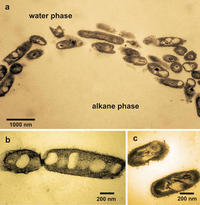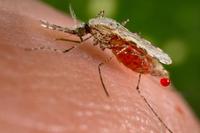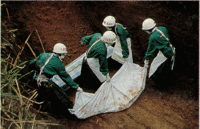-
Brazil’s problem: abundant grain, inadequate storage
Tropical climates that allow for year-round farming would seem to be a tremendous economic advantage, but for corn and soybean farmers in the Brazilian state of Mato Grosso it also poses a problem — an abundance of grain followed by about a 10 percent postharvest loss, partially due to a lack of storage.
-
-
Oil-devouring microbe communities a mile deep in the Gulf

The Deepwater Horizon explosion on 20 April 2010, caused the largest marine oil spill in history, with several million barrels of crude oil released into the Gulf of Mexico over the course of three months. Soon after the spill began, a massive oil slick was visible from orbiting satellites, yet once the underwater gusher was sealed, obvious traces of the crude oil disappeared much sooner than nearly all observers predicted. Some of the oil evaporated; some was skimmed off. Microbes “ate” much of the oil as well.
-
-
New way found to battle mosquitoes carrying diseases

In the global war against disease-carrying mosquitoes, scientists have long believed that a single molecular door was the key target for insecticide. This door, however, is closing, giving mosquitoes the upper hand. In a study published this week, a team of researchers has discovered a second gateway that could turn the tide against the mosquitoes’ growing advantage.
-
-
Treating oil spills with chemical dispersants may do more damage than good
Treating oil spills at sea with chemical dispersants is detrimental to European fisheries. Post-spill chemical dispersants may reduce problems for surface animals, but the increased contamination under the water reduces the ability for fish and other organisms to cope with subsequent environmental challenges.
-
-
Researchers highlight problem of legacy mercury in the environment

Researchers have published evidence that significant reductions in mercury emissions will be necessary just to stabilize current levels of the toxic element in the environment. So much mercury persists in surface reservoirs (soil, air, and water) from past pollution, going back thousands of years, that it will continue to persist in the ocean and accumulate in fish for decades to centuries, they report.
-
-
Increasing food production from existing farmland
A policy known as sustainable intensification could help meet the challenges of increasing demands for food from a growing global population. The goal of sustainable intensification is to increase food production from existing farmland. Sustainable intensification would minimize the pressure on the environment in a world in which land, water, and energy are in short supply.
-
-
Antibiotic from a marine microorganism is effective against anthrax
A new potential drug from a marine microorganism is effective against anthrax. Researchers have isolated a species of Streptomyces from near-shore sediments near Santa Barbara, California. The culture extracts demonstrate significant activity against anthrax.
-
-
Improving crop resilience, yields in a world of extreme weather
Farmers in the United States witnessed record-breaking extremes in temperature and drought during the last two summers, causing worldwide increases in the costs of food, feed and fiber. Indeed, many climate scientists caution that extreme weather events resulting from climate change is the new normal for farmers in North America and elsewhere, requiring novel agricultural strategies to prevent crop losses. UC Riverside-led research team develops new chemical for improving crop drought tolerance.
-
-
Radiation dose passengers receive from airport scanners is low
An independent task force examining X-ray backscatter scanners at LAX airport determines that that people absorb less radiation from airport X-ray backscatter scanner than they do while standing in line waiting for the scan.
-
-
Rapid, on-site detection of illegal cooking oils

In recent years, illegal cooking oil incident in China caused serious food safety risks. Researchers have developed two rapid and convenient colorimetric detection methods of illegal cooking oils based on phase transfer technology.
-
-
FDA shuts down more than 1,500 online pharmacies

The U.S. Food and Drug Administration (FDA) and Interpol have shutdown 1,677 online pharmacies for selling counterfeit or substandard medication and selling drugs without the necessary safeguards.
-
-
FDA warns about vulnerability of medical devices to hacking
The Food and Drug Administration (FDA) has warned manufactures of medical devices implanted into the human body, such as pacemakers and insulin pumps, to step up their cybersecurity efforts. The agency said it has discovered “cybersecurity vulnerabilities and incidents that could directly impact medical devices or hospital network operations.”
-
-
FDA-approved medications may stop deadly ebola

Ebola infections carry fatality rates of up to 90 percent. It strikes both humans and other primates, and there are fears it could be used as a biological weapon. There is no cure. New research suggests that a class of drugs that includes treatments for breast cancer and infertility appears able to inhibit the deadly, incurable Ebola virus.
-
-
The future of Colorado River flows
The Colorado River provides water for more than thirty million people, including those in the fast-growing cities of Las Vegas, Phoenix, and Los Angeles. Increasing demand for that water combined with reduced flow and the looming threat of climate change have prompted concern about how to manage the basin’s water in coming decades.
-
-
Smart technologies tackle global food shortage
From monitoring soil moisture to measuring oyster heartbeats, Aussie farmers can help to tackle the global food shortage and significantly increase their productivity by taking advantage of new smart farming technologies enabled by next generation broadband networks.
-
More headlines
The long view
Ransomware Attacks: Death Threats, Endangered Patients and Millions of Dollars in Damages
A ransomware attack on Change Healthcare, a company that processes 15 billion health care transactions annually and deals with 1 in 3 patient records in the United States, is continuing to cause massive disruptions nearly three weeks later. The incident, which started on February 21, has been called the “most significant cyberattack on the U.S. health care system” by the American Hospital Association. It is just the latest example of an increasing trend.
